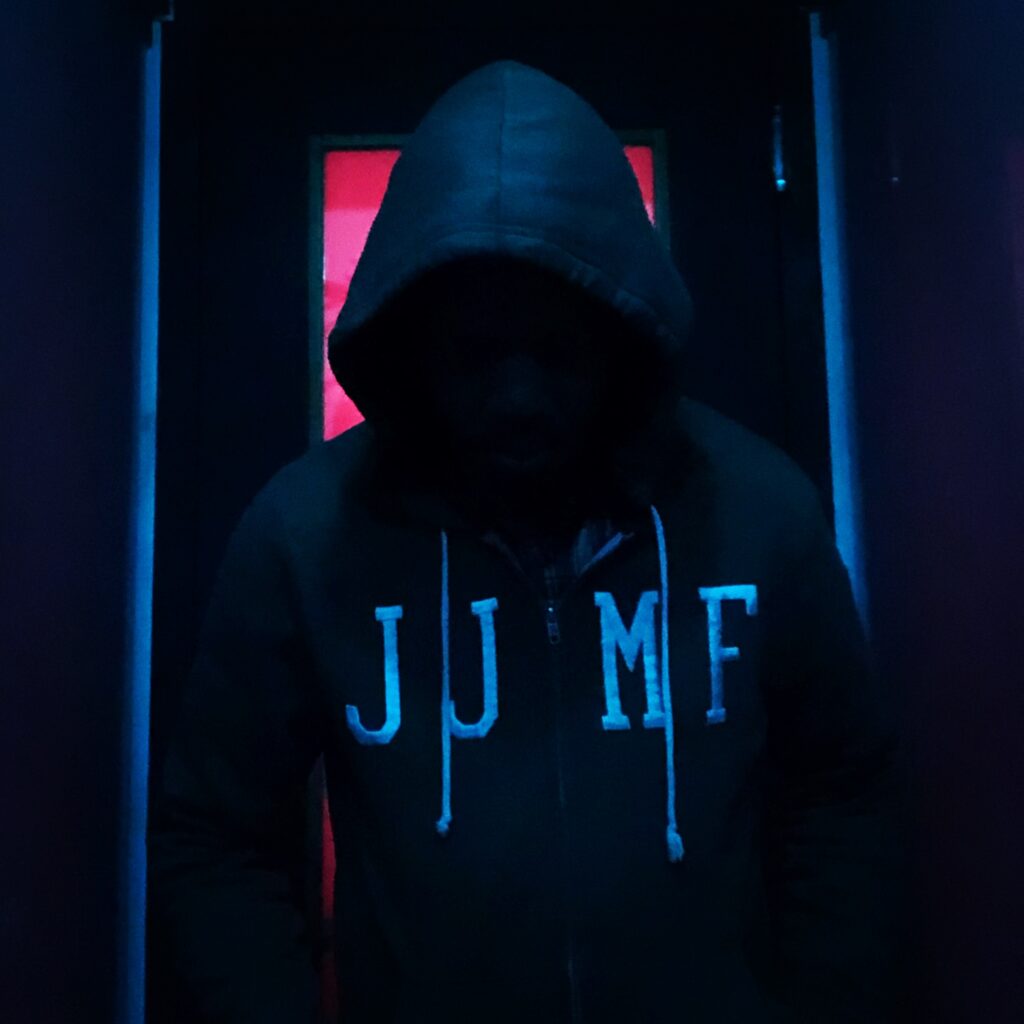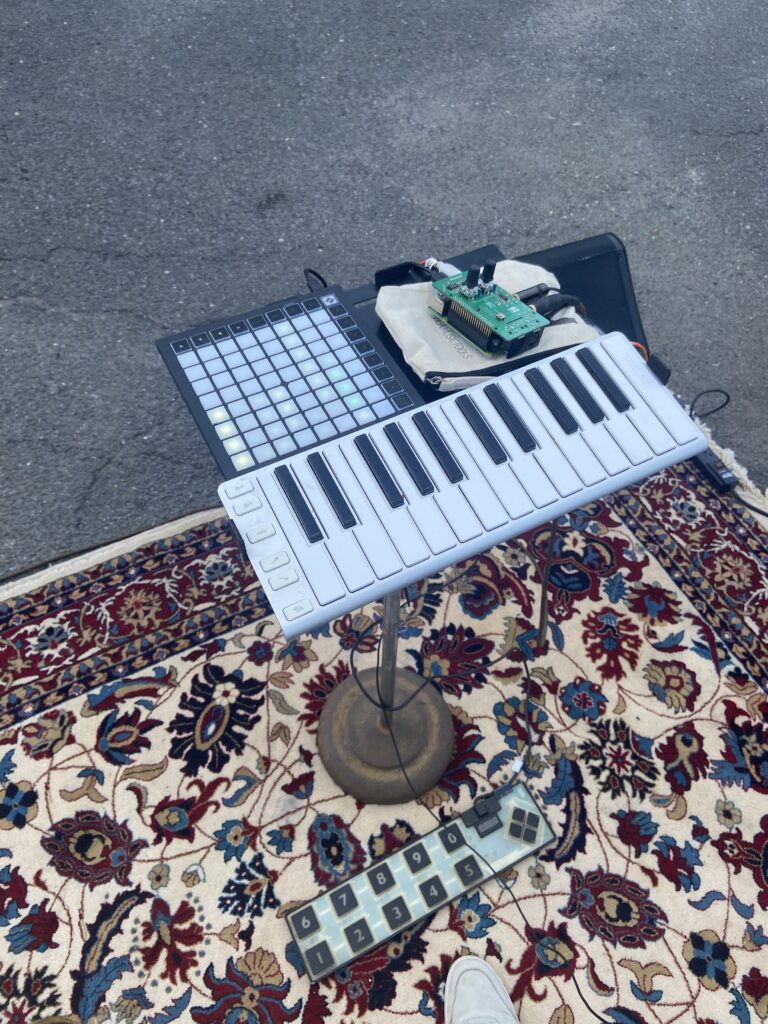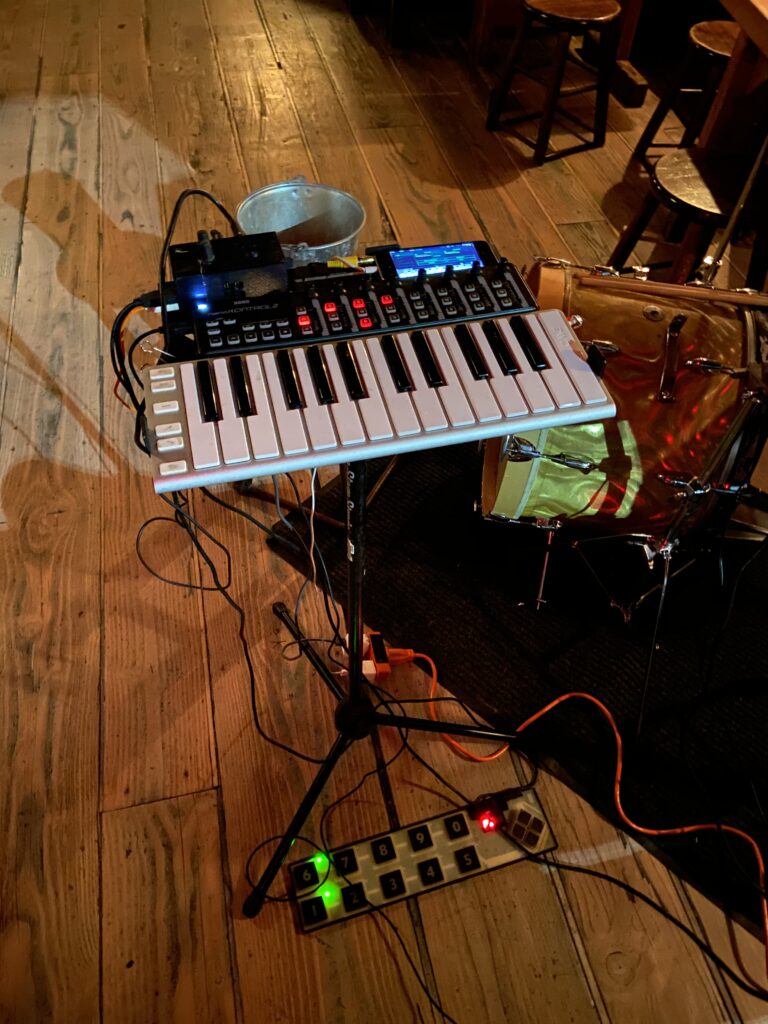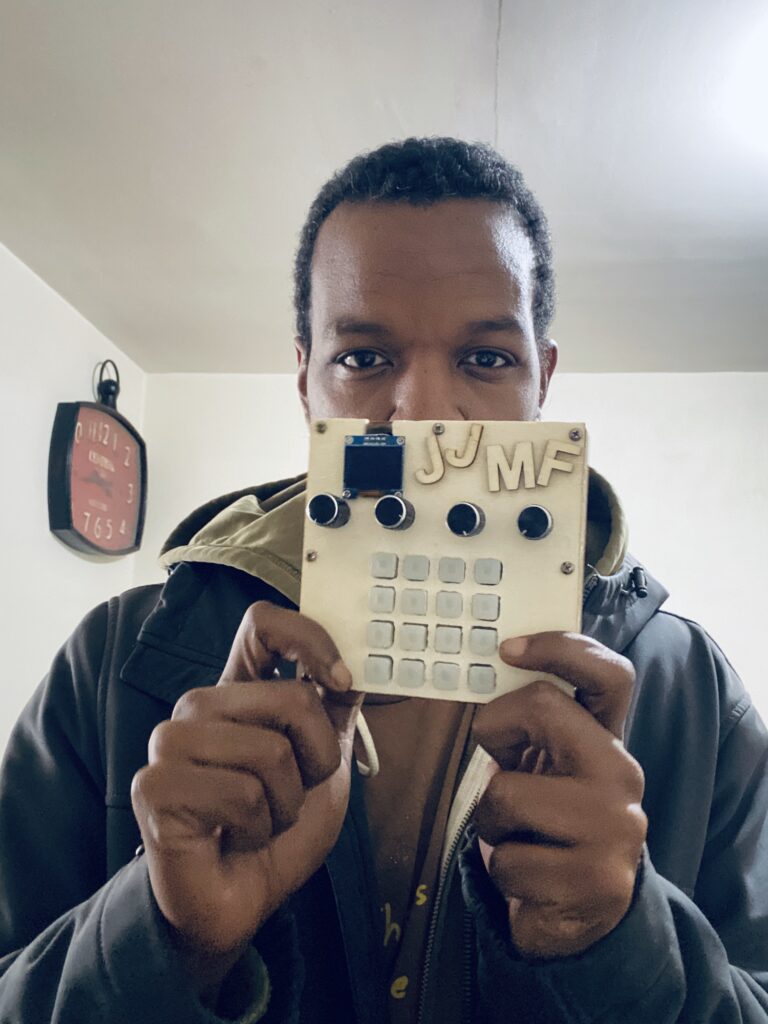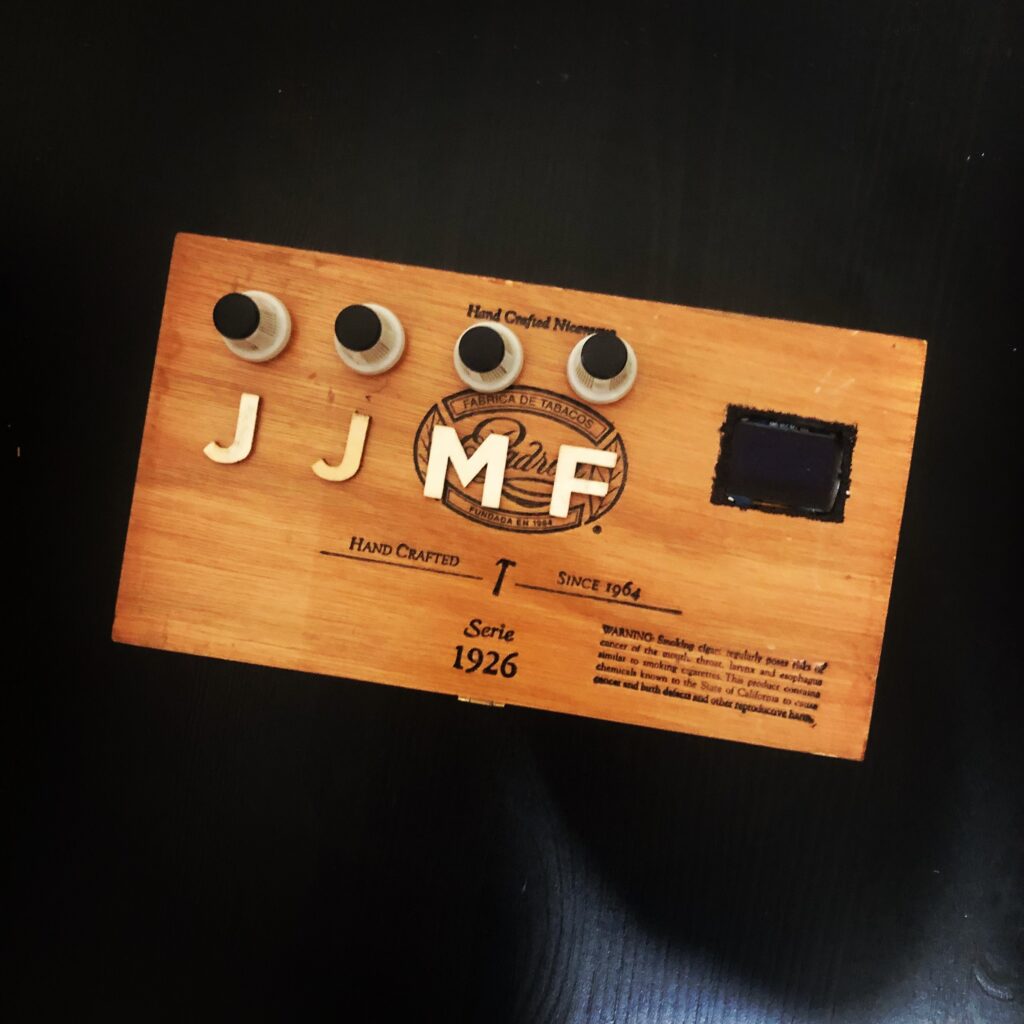If you have ever wondered what happens when jazz meets technology, we introduce you to JJMF. In 2018 saxophonist Joey Johnson started his solo music project JJMF, which explores the possibilities of the latest technology, including our Pisound, that helps to produce a fresh and unique sound. Since 2018 JJMF has already released two EPs Tape: One and My Own Devices and is currently working on his new projects. Today we asked JJMF to share his thoughts on music, its perks, and challenges.
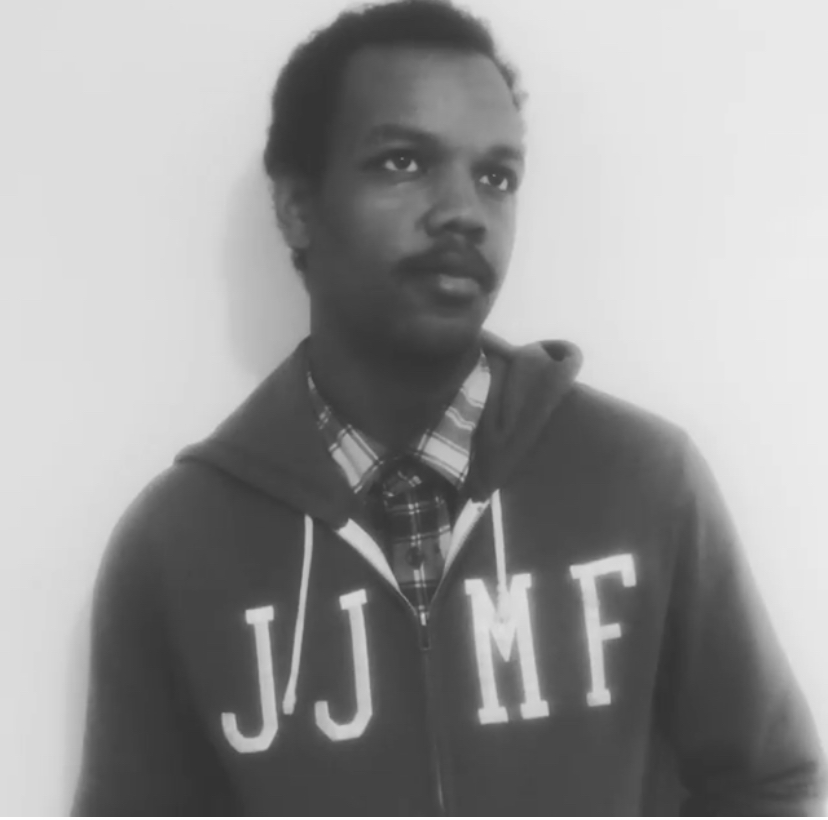
Tell us a little bit about yourself. What is the backstory of your name JJMF and what does it mean?
The name comes from a nickname and an ugly sweatshirt. On New Year’s Eve a few years ago I went out in this really garish looking sweatshirt. I thought it was hideous, but I received a lot of compliments on it, so I thought maybe I should get another one. I went shopping, but I couldn’t find anything that I liked. I ended up just buying a green hoodie and some iron-on letters from a craft store. The letters I chose were JMFJ because a fair amount of my friends refer to me as Joey “MF” Johnson. The “MF” stands for what you probably think it stands for. The letters looked better on the sweatshirt arranged as JJMF, so that’s what I did.
When and why did you start the JJMF project, and how would you describe its sound?
The project started in 2018. I wanted to make an EP with my band “Little Gorgeous”, but scheduling issues prevented us from doing it. I really wanted to put some music out and figured maybe I could try to put out something by myself. That’s why the first JJMF EP was made.
I would describe the sound as honest. I don’t really aim to make a specific type of music and I try to keep an open mind when consuming music. The hope is that what comes out is a unique sounding amalgamation of all of the music that has informed me.
Please tell us more about your creative process. What was the inspiration behind your two EPs, and how long did it take to write them? In general, when do you know that you have just enough material to release an album?
The first EP took about a week to make. I was putting this album out on tape and I had purchased the blank tapes before I knew what the music was going to be, so the length of the album was determined by the length of those tapes.
The second EP was also made in about a week. I made that one simply because I had some music and some new tricks that I wanted to get out there into the world.
I write little snippets of music all of the time. They are just small ideas not fully realized compositions. I don’t write them for any specific purpose. It’s just something I do. When it comes time to make a recording I dig up some of these snippets to see if I can turn them into something more substantial. Some of my newer music is composed of fragments of things from over a decade ago.
Why do you think it is important for a musician to keep performing live? In your opinion, what are the similarities and differences between a live performance and record for you, the performer, and the audience?
Performing live keeps a musician honest. When making a recording you can fix your mistakes and make everything sound just like you want, but you lose some of that immediacy that you have when performing live. When performing live there’s a lot more risk, but there are also a lot more possibilities. I’m much more likely to take chances when performing live because I know that whatever mistakes happen when you’re really trying to go for something aren’t going to be in the public record for the rest of my life. I also think it’s important to hear live music. Instruments sound way different in person. It’s good for people to hear those sounds.
I often do have other musicians join in, especially when performing live. Most of the live performances have been with drummer Christian Coleman. Sometimes we’ll add a third person usually either bass, guitar, or keys. We’ve had Diallo House, Nick Jost, Julian Smith, and Nathan Peck on bass, Jeff Miles and Paul Orbell on guitar, and Russell Kranes and David Caldwell-Mason on keys. It’s interesting to play the same music with different configurations of people. Everyone brings something of their own to the table.
Please, tell us more about your setup. Why did you choose it, and how long did it take to build it?
My setup consists of the Raspberry Pi, the Pisound, and some MIDI controllers. I’ve made a few DIY MIDI controllers centered around Arduinos, but right now I’m using off the shelf controllers until I can figure out how I want the next one to function. They don’t take too long to build. Most of the time is spent fixing bugs in the code or just simply deciding how something should function.
Why did you choose the Raspberry Pi and Pisound combo instead of some off-the-shelf effects processors, and how does it contribute to your sound?
I choose the Raspberry Pi and Pisound combo because I love working with Pure Data and I hate lugging around a lot of stuff. Prior to working with the Pisound, I was using a regular USB audio interface. Everything was really unstable. I can’t tell you how many times I had to covertly reboot the Raspberry Pi in the middle of a performance. With the Pisound, I should also mention Patchbox OS, everything runs so much better. I spend way less time troubleshooting and a lot more time actually making music.
I try not to use off the shelf stuff too often because I like knowing that I’m the only person that has what I have and it allows me to do things that I wouldn’t be able to do otherwise. The harmonizer that I use is made in Pure Data and it has functions that I couldn’t find in any pedal out there on the market. It’s this freedom to create what I need and discard what I don’t that attracts me to this technology.
What inspires you? Are you a type of creator who waits for the muse, or do you have a strict routine that keeps you going? What other artists and musicians influence your music and why?
I can be inspired by almost anything. I get a lot out of seeing people successfully execute whatever it is that they are passionate about. This could be music, visual art, sports highlights, cooking shows, break dances, or whatever.
I make music all of the time, but I don’t have a strict routine. I’m definitely more of a waiting for the muse type. I’m more disciplined with my practising than I am with composition.
Sonically, I’d say that I am heavily influenced by Bjork. I find her production, the composition, and the mood of her music to be really compelling.
On the saxophone side of things, I come from the jazz side of music. The most influential musician for me in that regard would be my teacher, the late Paul Jeffrey. He was the one that taught me basically everything I know about jazz and saxophone. He spent some time playing with Charles Mingus and Thelonious Monk and he was good friends with Sonny Rollins. So naturally, he passed down an appreciation of those three, amongst many others, to me.
What are your future plans? Do you have any exciting projects you are working on at the moment? Perhaps a new album?
I’m trying to put out a fair amount of music in the coming year. I’m hoping to release multiple EPs of JJMF stuff with various combinations of people. Some of the recordings have already begun.
Follow JJMF
instagram.com/JJMFbandcamp.com/JJMF

